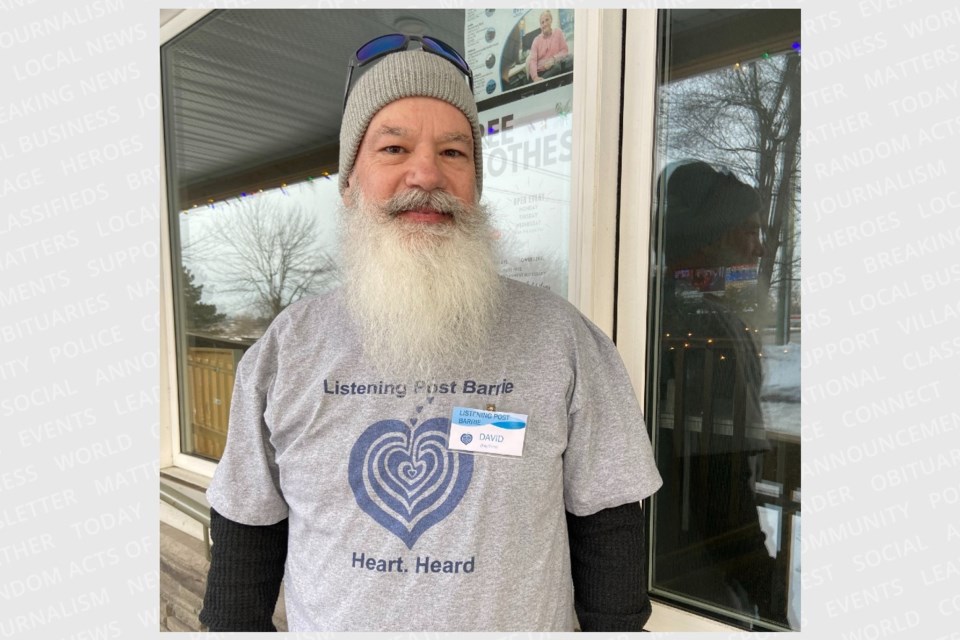As David Hill approached the final stages of his business career, he began to cultivate the desire to help people who were struggling to open up emotionally for fear of judgment and stigma.
“I was grappling with the reality that as good as a career can be, listening, and especially listening deeply with people, isn’t the way things work in our culture and institutions,” says Hill, who volunteers for the drop-in listening service Listening Post Barrie.
As a self-styled deep listener, Hill finds himself helping people experiencing a variety of mental distress. For instance, those who lost a family member to addiction, who had to leave the family behind, or those who are estranged from the family.
“I’ve been told that being listened to is helpful validation of their humanity, that it dignifies their feelings, and even brings moments of peace simply because they are heard," he says.
Hill believes that, in deep grief and hard circumstances, being listened to and acknowledged as a person of inestimable worth can be a healing agent.
“It’s challenging to put into words, but when people are truly heard they can experience moments of complete ‘OK-ness,' while their lives at a quick glance may seem anything but OK," he adds.
By providing a safe, nonjudgmental and confidential conversation, Hill helps people to cope with feelings such as what it’s like to leave a child behind, lose their identity or just express profound exhaustion at being so tired and fearful of never feeling safe or loved.
Hill says those thoughts and emotions are also expressed by front-line workers, especially those who care for the most vulnerable members of our society.
“When they trust us enough to share their stories of compassion, fatigue, grief, joy, kindness, and their frustrations with the system, it’s extremely humbling and gratifying," he says.
Hill noted that listening isn’t what our fast-paced culture prioritizes and, even at their best, the systems we depend on, including political, educational, religious, social, and economic, don’t operate with the goal of making sure people are heard.
“People in these systems are so busy with and sometimes exhausted by their responsibilities that they simply don’t have the time or capacity to listen deeply to the people they care for," he says.
Being listened to in a simple conversation without being given advice or being on the receiving end of someone else’s agenda is super rare in our Western culture, Hill says.
“Honestly, outside of my nuclear family, I’m only aware of three times in my life where I knew that I had been listened to deeply in this way," he says.
A typical Listening Post conversation often begins with a genuine question that only the other person can answer such as, 'How are you really doing today?'
Hill says trust is built over time by being consistently available and present at the various Listening Post locations, from week to week and from one shift to the next.
“After a period of time, kindness, respect, and not forcing a conversation or agenda strikes a common human chord with most people and conversations just develop organically," he says.
As for the basic components of listening well, Hill cites eye contact, gentleness, attentive posture, calmness, verbal affirmation, not talking over anyone, and not thinking about what to say next.
“We also work at emptying ourselves of any distractions or assumptions ahead of a listening shift that would keep us from being present as we listen," he notes.
Most importantly, though, are cues and clues that remind us to pay attention and not avoid or assume what is going on without checking in, Hill says.
“The next person you see could be someone who is trying their best to not fall apart. So whatever you do, ask them how they are, and listen with kindness in your heart," he says.
However, a listening conversation can be not only about something that is difficult, but also something that is being celebrated.
“I think everyone needs heart to heart connection to feel safe and valued, so whether they are venting or not, listening is important.”
The Listening Post Barrie has as goal that deep listening becomes a core value in our town, honoured and uplifted, so that everyone is heard and seen as a valuable part of a more just world.
“Sadly, listening as a healing agent is far more rare than it should be and is in danger of becoming extinct in places where we need it to be alive and well," he says.
The program is operating at The Busby Centre, Elizabeth Fry Society, Barrie Public Library downtown branch, Barrie Public Library Painswick branch, Breakfast-to-Go, Aspira Waterford Retirement Residence, Lucy’s Place, RSVP Clubhouse, and Samaritan House Resource Centre.
For listening shift schedules, contact [email protected].
The program also offers training in deep listening to anyone interested, individuals (whether volunteers or not), groups and organizations.
With start-up funding from the United Church of Canada Foundation ending this year, the Listening Post Barrie is seeking individuals or groups for collaboration and support. To learn more about ways to give financially, go to the donor page at listeningpostbarrie.ca.



